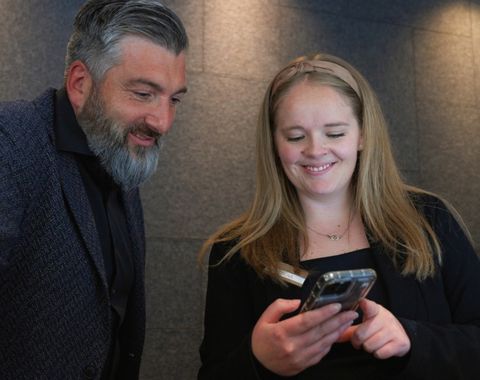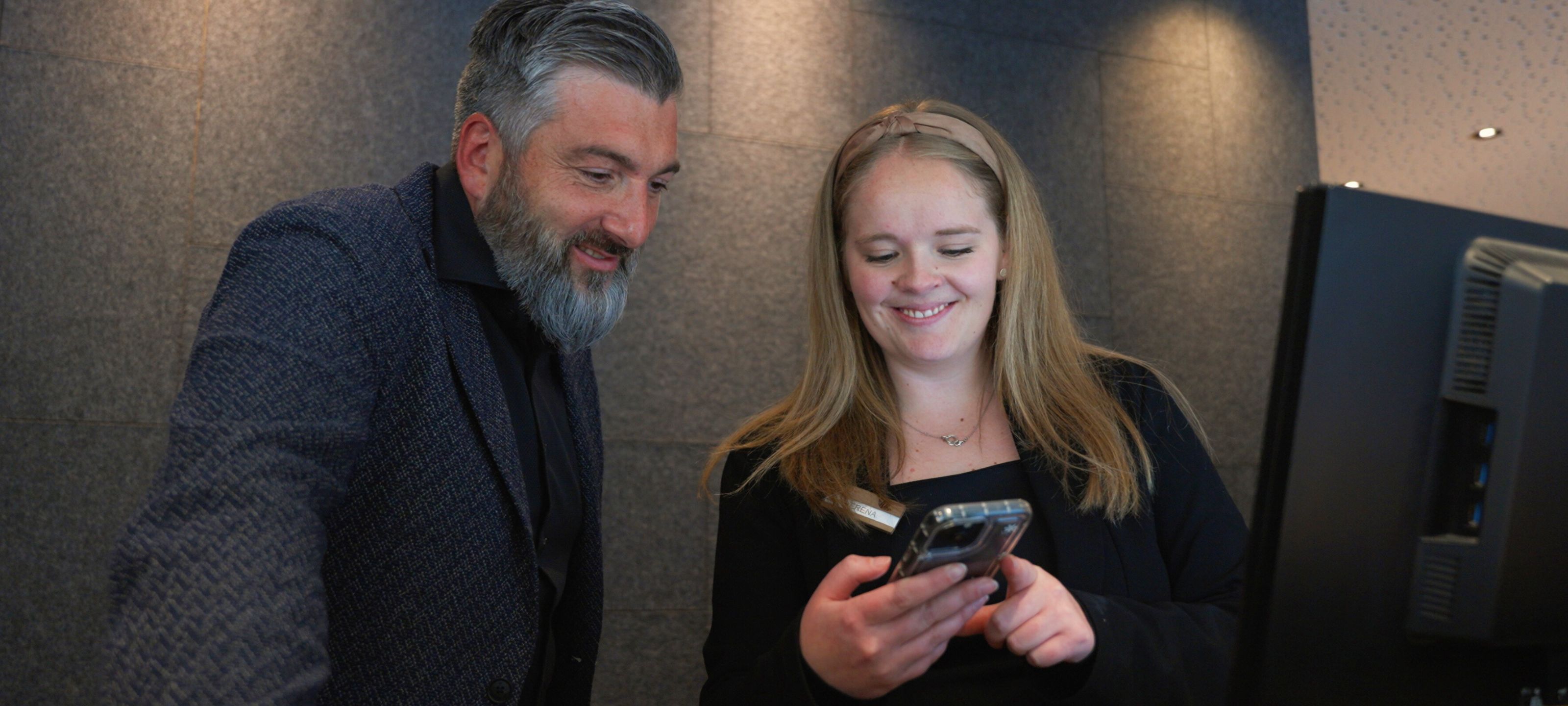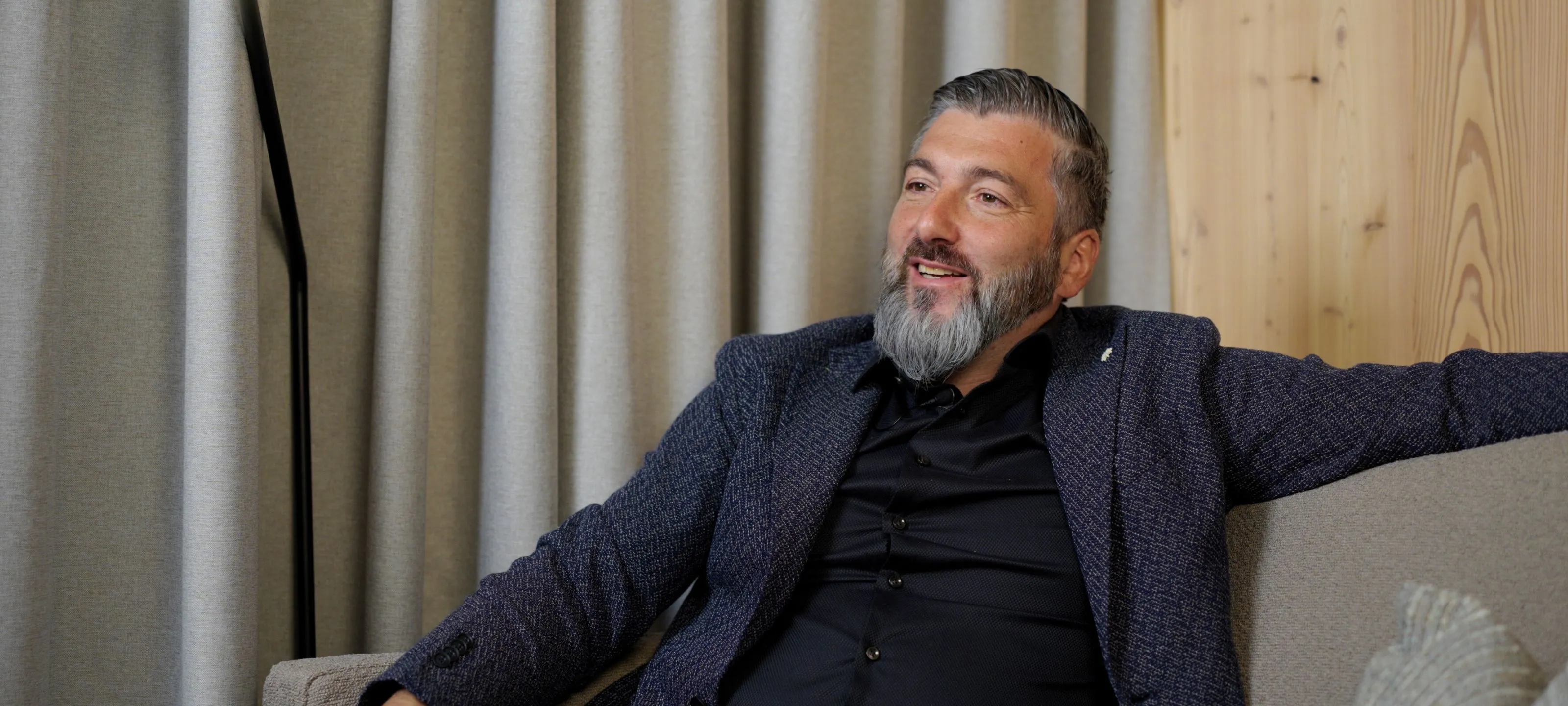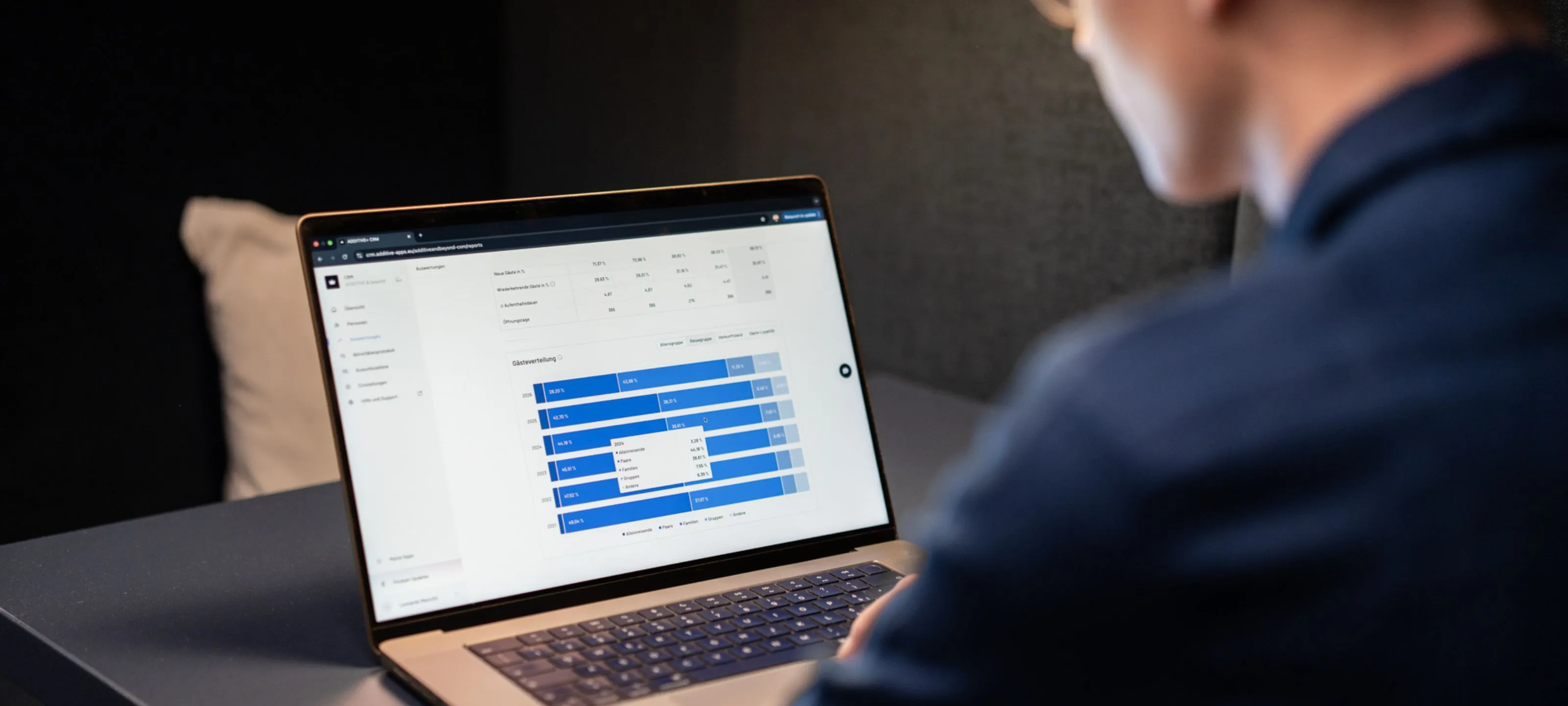
In Conversation with Laura Kockott and Frederik Sens, Gorki Apartments Berlin

In our exclusive interview, Laura Kockott and Frederik Sens from Gorki Apartments Berlin share their insights into successful online marketing and innovative strategies. Learn how modern communication channels are driving the property's success in the digital age.
<div class="article_quote is-img">
<img
src="https://cdn.prod.website-files.com/673f1b4d7fc04861927e7983/67b43cdbcb5dc9dcfb2536e8_800x800px%20-%20Im%20Ge_spra%CC%88ch%20mit%20Laura%20Kockott%20und%20Frederik%20Sens%2C%20Gorki%20Apartments%20Berlin.jpg" loading="lazy" alt=""
class="article_quote_img">
<div class="article_quote_contain is-img">
<div class="article_quote_quote">
"The small things make all the difference." </div>
<div class="article_quote_name u-text-style-main">
Laura Kockott
</div>
</div>
</div>
Source: Xing
A Unique Boutique Concept in Berlin
The Gorki Apartments in Berlin-Mitte are located in a Wilhelminian style building from the beginning of the 20th century. The complex includes 34 individually furnished apartments and two luxurious penthouses that are designed to be a "home away from home" for guests. Joachim Leiter of ADDITIVE spoke with Laura Kockott, Director of Gorki Apartments, and Frederik Sens, Marketing Manager of Gorki Apartments.
.webp)
<h3 class="interview-question">What makes Gorki Apartments unique?</h3>
Frederik Sens: The apartments themselves are an important aspect. With this historic building and the individually designed apartments, we have a unique product.
Laura Kockott: There are a lot of antiques, design classics and high quality elements. It's this mix that sets us apart. Our architect spent five years scouring antique markets in Paris and Berlin for the right furniture, such as tables, pictures and lamps.
Then there is the individuality of the staff and the fact that we want our guests to feel at home. We greet them as if they were our friends, they get a beer or a glass of wine when they check in, and our employees don't wear uniforms. Everyone comes to work in a way that makes them feel comfortable, and guests can tell that these are not people putting on an act.
<h3 class="interview-question">Have the Gorky Apartments already become a brand?</h3>
F. Sens: Recently we have become a bit more mature. We are going in a certain direction and using a certain tone and visual language. We are already well known in the Berlin hotel industry and there are several people from the creative scene who are looking for places like this. Commercials and rap videos have already been shot in the apartments. The pictures of the apartments speak for themselves, but in real life and live on location, the individual apartments are even more beautiful and create real enthusiasm.
L. Kockott: We are also well known in the architecture scene. Some time ago I met an architect who knew about the Gorki Apartments because they were featured in many architectural magazines. People interested in art and architecture and the Berlin hotel scene already know about us.
<h3 class="interview-question">What are the difficulties in managing and selling a boutique apartment project compared to the opulent offerings of chain or branded hotels in Berlin?</h3>
L. Kockott: The difficulty is that you have to invest a lot of money in marketing and PR to get the visibility you need. However, there is a certain target group that would never go to a hotel chain, but is looking for exactly what we offer. For example, during ITB it would be easier to choose a hotel in the west of Berlin because it is closer to the fair. But this is where people and hoteliers come who have a small boutique hotel themselves and want to try the Gorki Apartments. I myself wouldn't go to a big hotel chain because I don't feel comfortable there. The good thing is that there is no one behind us telling us what to do. We can be creative and try new things.
F. Sens: I think we reach the right audiences efficiently through our visual language. We have powerful images that present the product very well.
L. Kockott: Customer satisfaction is the most important thing for us. You can see it in our ratings. If you're not at the top of your game, it's really difficult. The meaningful pictures and the score that results from the guest ratings are important elements.
<div class="article_quote"><div class="article_quote_contain"><div class="article_quote_quote">"Customer satisfaction is the most important thing for us. You can see it in our ratings. If you're not at the top of your game, it's really difficult."</div><div class="article_quote_name u-text-style-main"> </div></div></div>
<h3 class="interview-question">What does "digitalization" mean to you in the hotel industry? What opportunities and risks do you see?</h3>
F. Sens: I think for large hotels it helps if you can standardize and speed up processes. At our size, however, a direct method of communication is perfectly sufficient. In the backend, it makes sense to digitize processes, but I don't think it's justified when it comes to communicating with the guest - after all, we have the time for personal contact.
L. Kockott: We use a cloud-based PMS (Property Management System), which will have an important innovation this year (2020), so that passports and similar documents can be scanned with the camera at check-in. This is of course a great advantage because the data is transferred to the guest file and you don't have to sit in front of the guest and type everything out manually. This gives you more time to talk to the guests, because we love personal contact. We're happy to be part of that digitalization process, but we're not happy with anything else. For example, if you think about being able to unlock your room door with your cell phone - we don't want that, because having a real key with a pendant in your hand is what makes you feel like you've arrived at your second home. Guests know that there is always someone at the front desk 24 hours a day and that they can always go there if they have any questions, instead of communicating with an iPad or some other device, that is also part of our service. We want to make it as easy as possible for the guest to book through the website and we want to be available through all media at all times.
Especially in our niche, I think this is what sets us apart from the rest. There will always be guests who appreciate that and want that direct contact. Digitalization has its advantages, but it also has its limits. When digitalization makes life easier, such as with back-end processes, its use is justified. But in the normal contact with people, I don't think it's always an advantage.
<h3 class="interview-question">How many people work in marketing / online marketing & communications? Is there a person in charge of digital strategy?</h3>
F. Sens: Especially when it comes to brainstorming, we do almost everything as a team and then the implementation is in my hands. We also have a new provider for our website who also helps us with marketing.
<h3 class="interview-question">Which digital channels do you use most and how intensively?</h3>
F. Sens: In addition to the usual channels like Facebook and Instagram, Google My Business is very important for us - because of the reviews and the images we get there. On Facebook and Instagram, we work a lot with images, and on Facebook we also run ads in certain markets. It's all done in-house.
In order to be able to attribute booking sales, everything has to be perfectly linked - we're still working on that because I'd like to track that. I think you inspire a lot of people on the different channels, but then you can't track them, and of course our own (new) website with the booking engine.
.webp)
Innovative Marketing Strategies at Gorki Apartments
<h3 class="interview-question">What is your opinion on OTAs (Online Travel Agencies)?</h3>
L. Kockott: Of course you pay Booking.com a lot of commission, but it's not too much for us and I think it's good that you get a lot of visibility. It's the same with social media campaigns: Some users just look at the pictures and then book directly. I myself get inspired on Booking.com and then contact the accommodation.
I think the combination of our own channels and the OTAs is crucial. Something can always happen and our website can go down due to a technical problem. If we are not visible on Booking.com, we will not get any more requests. That's why I think this distribution is essential for a small hotel like us.
<h3 class="interview-question">Does Gorki Apartments have a loyalty program?</h3>
F. Sens: We have the "Moustache Gang" where you log in to the website. We are also trying to use WhatsApp more. Every guest gets a card with our number when they arrive, and that is the first communication channel - ideally also after their stay. We often have guests come back to us via WhatsApp. In the future, we would like to use WhatsApp for most of our communication, for example when guests contact us via WhatsApp even though they found us on Booking.com.
L. Kockott: We also have various collaborations, for example with Dr. Hauschka cosmetics or Be my friend. If a guest wants an apartment with a bathtub, we provide Dr. Hauschka bath foam. If we know a guest likes beer, we put two more bottles in the fridge. We don't have a special loyalty program that rewards anyone, but we pay attention to things like that. Those little things make all the difference.
<h3 class="interview-question">Are influencers playing a role in marketing and sales?</h3>
F. Sens: In the beginning, we worked with influencers from time to time, but we realized it wasn't for us. Now we rely more on professional photographers and travel journalists. We are still contacted by influencers on a daily basis, and the volume of requests is now so great that it is impossible to respond to all of them. But we are not worried about distribution, because those who come here and pay for it are still sharing their photos and experiences because this is a beautiful building.
<h3 class="interview-question">What projects come to mind when you think of new, outstanding hotel concepts around the world?</h3>
F. Sens: We tend to like the small buildings. Personally, I worked for a while in London in a small townhouse that was very high-end and authentic at the same time. Exactly what we want to convey.
L. Kockott: The inspiration for the Gorki Apartments comes from Paris, a city that is a pioneer in this field. Berlin does not have much to offer in this respect. The Gorki Apartments are unique here. It must be said that the cost of such a small house is immense. Nevertheless, our owner enjoys running such a house. It is really a playful house, which can completely replace your own home. That is why we are different from the classic hotel. Many try to keep the costs as low as possible and therefore focus on the highest possible number of beds.
<h3 class="interview-question">Is there someone in the tourism industry (or in any other field) that you have always wanted to meet? Why and what would be your main question to this person?</h3>
L. Kockott: For me, there is no particular personality. Three years ago, I went on a big trip for three months, which included Cambodia. There I met a German who had built a small shelter with five bungalows. I find it interesting to talk to people like that and share experiences and find out where such ideas come from and how you find the courage to do it. After all, you have to put a lot of capital into a project like this, and you can't be sure that you'll be successful in the end. I like to spend time with people like that to exchange feedback.
F. Sens: I don't have a particular personality I would like to meet either. Similar to Laura, I am much more interested in individual concepts. You get inspiration from different people, and you should be open to everything.
.webp)







.jpg)

.jpg)



.webp)
